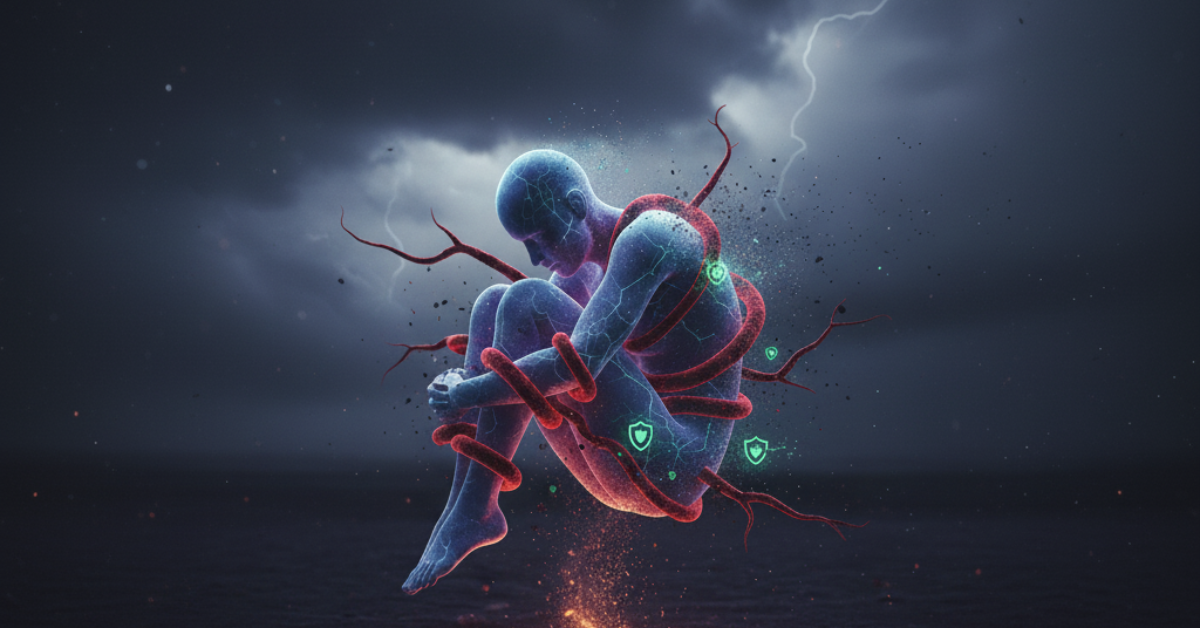Do you find yourself exhausted after climbing a flight of stairs? Does that afternoon slump hit harder than it used to? You're not alone. Millions of people struggle with low stamina, feeling like their energy reserves are constantly running on empty.
While we often blame getting older or being "out of shape," the reality is more complex. Your stamina issues might stem from a combination of physiological, lifestyle, and nutritional factors that are quietly sabotaging your energy levels every single day.
Let's dive into what's really happening in your body and why even simple tasks can feel overwhelming.
What Actually Happens When Your Stamina Takes a Hit
Think of your body like a car. When you're running smoothly, oxygen flows efficiently to your muscles, your mitochondria (the cellular powerhouses) are humming along, and everything works in harmony. But when stamina drops, it's like having a clogged air filter, old spark plugs, or low-quality fuel.
The Oxygen Delivery Problem
Your cardiovascular system is essentially your body's delivery service for oxygen. When this system becomes inefficient—whether from lack of use, stress, or poor health habits—your muscles don't get the oxygen they need to perform. This is why untrained adults typically have a VO₂max (oxygen utilization capacity) of just 28-32 ml/kg/min compared to elite athletes who can reach 70+ ml/kg/min.
But here's the encouraging part: even modest improvements can make a huge difference in how you feel during daily activities.
Your Cellular Energy Factories Are Understaffed
Mitochondria are like tiny power plants in your cells. The more you have, and the better they function, the more energy you can produce. However, sedentary lifestyles can reduce mitochondrial density by up to 40% in just two weeks. This means fewer power plants working to fuel your activities.
Research shows that each 1% increase in mitochondrial density correlates with 2-3% longer endurance capacity. Translation? Small improvements in cellular health can lead to noticeable stamina gains.
The Lifestyle Culprits Stealing Your Energy
Sleep: The Foundation You Can't Skip
Poor sleep isn't just about feeling groggy—it's actively undermining your physical capacity. Studies indicate that getting less than 7 hours of sleep can decrease your time to exhaustion by 15-30%. Your body uses sleep to repair muscles, consolidate cellular energy systems, and reset hormonal balance.
When you're sleep-deprived, your body produces more cortisol (stress hormone) and less growth hormone, creating a perfect storm for reduced stamina.
Chronic Stress: The Silent Energy Thief
Persistent stress keeps your body in a heightened state, constantly producing cortisol and adrenaline. While these hormones are helpful in short bursts, chronic elevation leads to:
-
Disrupted sleep patterns
-
Increased inflammation
-
Reduced muscle recovery
-
Impaired nutrient absorption
-
Mental fatigue that compounds physical exhaustion
The Sedentary Trap
Here's the paradox: the less you move, the more tired you become. Sedentary behavior doesn't just mean you're "out of shape"—it actively reduces your body's ability to produce energy efficiently. Your heart becomes less efficient at pumping blood, your muscles lose the ability to extract oxygen effectively, and your mitochondrial function declines.
Nutritional Gaps That Drain Your Battery
The Iron Factor
Iron deficiency is one of the most common nutritional causes of fatigue, especially in women. Iron helps carry oxygen in your blood—without adequate levels, your tissues are essentially suffocating. Even mild iron deficiency (before it becomes anemia) can significantly impact your stamina.
B-Vitamin Depletion
B vitamins are crucial for converting food into cellular energy. Chronic stress, poor diet, certain medications, and even excessive alcohol consumption can deplete these essential nutrients. When your B-vitamin levels drop, your cellular energy production suffers.
Protein: The Overlooked Stamina Nutrient
While carbs get attention for energy, adequate protein is essential for maintaining the muscle mass and enzyme systems that support endurance. Many people, particularly as they age, don't consume enough high-quality protein to maintain optimal energy production.
Hormonal Imbalances Affecting Your Get-Up-And-Go
Your endocrine system orchestrates energy production throughout your body. When hormones fall out of balance, stamina often follows:
Thyroid Function: Even subclinical thyroid issues can leave you feeling sluggish and reduce your exercise capacity.
Cortisol Dysfunction: Both too much (from chronic stress) and too little (from adrenal fatigue) can impact stamina.
Sex Hormones: Declining testosterone in men and hormonal fluctuations in women can significantly affect energy levels and muscle function.
Natural Strategies to Rebuild Your Energy Reserves
Start With Your Breath
Proper breathing techniques can immediately improve oxygen delivery to your tissues. Practice diaphragmatic breathing for 5-10 minutes daily—breathe deeply into your belly rather than shallow chest breathing.
Embrace Cold Exposure
Brief cold exposure (cold showers, ice baths, or even cold plunges) can stimulate mitochondrial biogenesis and improve your body's stress response. Start with 30 seconds of cold water at the end of your shower and gradually increase.
Optimize Your Circadian Rhythm
Get morning sunlight exposure, limit blue light in the evening, and maintain consistent sleep-wake times. Your body's internal clock affects everything from hormone production to cellular energy metabolism.
Movement That Builds Rather Than Depletes
You don't need intense workouts to improve stamina. Consistent, moderate activity—walking, light resistance training, yoga—can significantly boost your energy systems without overwhelming your recovery capacity.
The Power of Traditional Approaches
Traditional Chinese Medicine and other ancient healing systems have long recognized herbs and compounds that support stamina and resilience. Adaptogens like ginseng, cordyceps, and other traditional ingredients work by helping your body adapt to stress and maintain energy balance.
These approaches often focus on supporting your body's natural energy production rather than providing temporary stimulation—creating lasting improvements rather than quick fixes.
When to Dig Deeper
If you've addressed lifestyle factors but still struggle with persistent fatigue and low stamina, consider working with a healthcare provider to investigate:
-
Comprehensive blood panels (including iron, B vitamins, thyroid function)
-
Sleep study evaluation
-
Hormonal assessment
-
Assessment for underlying health conditions
Building Sustainable Energy for Life
Improving stamina isn't about pushing through fatigue or finding the perfect supplement. It's about creating the conditions where your body can naturally produce and sustain energy. This means:
-
Prioritizing recovery alongside activity
-
Addressing nutritional gaps systematically
-
Managing stress proactively
-
Supporting your body's natural energy systems
Remember, stamina improvements often happen gradually. Small, consistent changes in how you sleep, move, eat, and manage stress can compound over time, leading to significant improvements in how you feel and function.
Your energy levels don't have to decline with age or stress. By understanding what's limiting your stamina and taking targeted action, you can rebuild your energy reserves and reclaim that feeling of vitality you remember having.
Want to learn more about how traditional ingredients like ginseng and horny goat weed can support male energy and stamina? Understanding these time-tested approaches might provide additional insight into natural stamina support.





